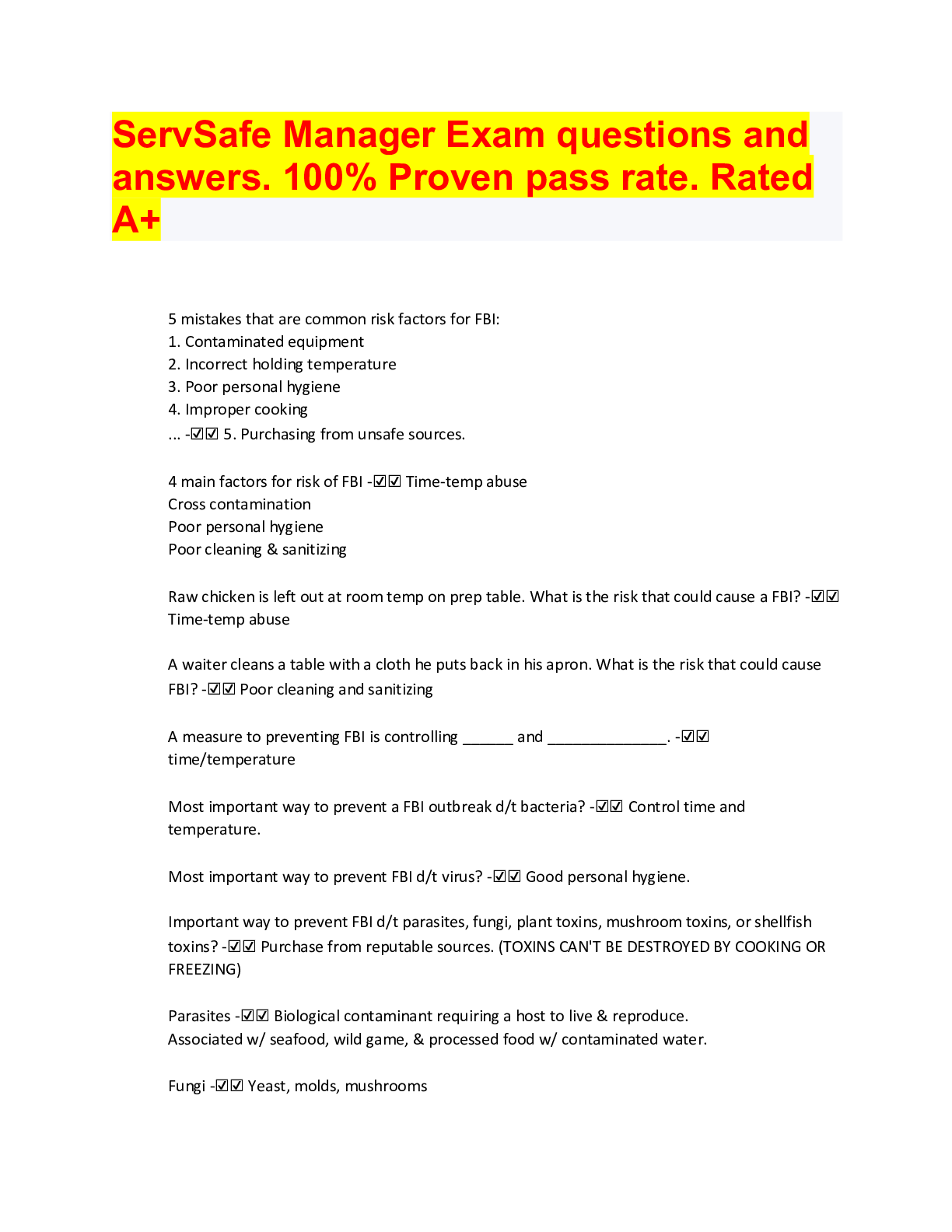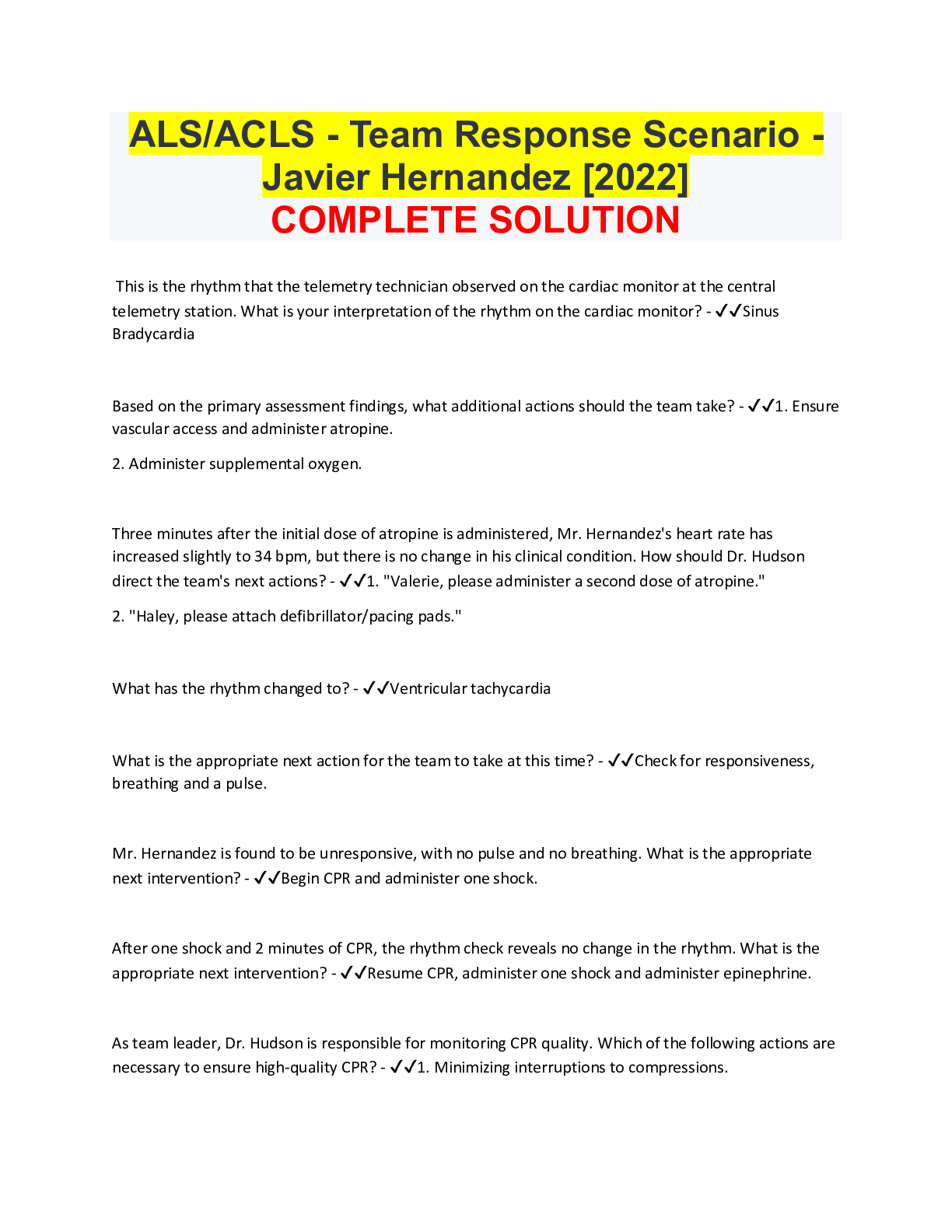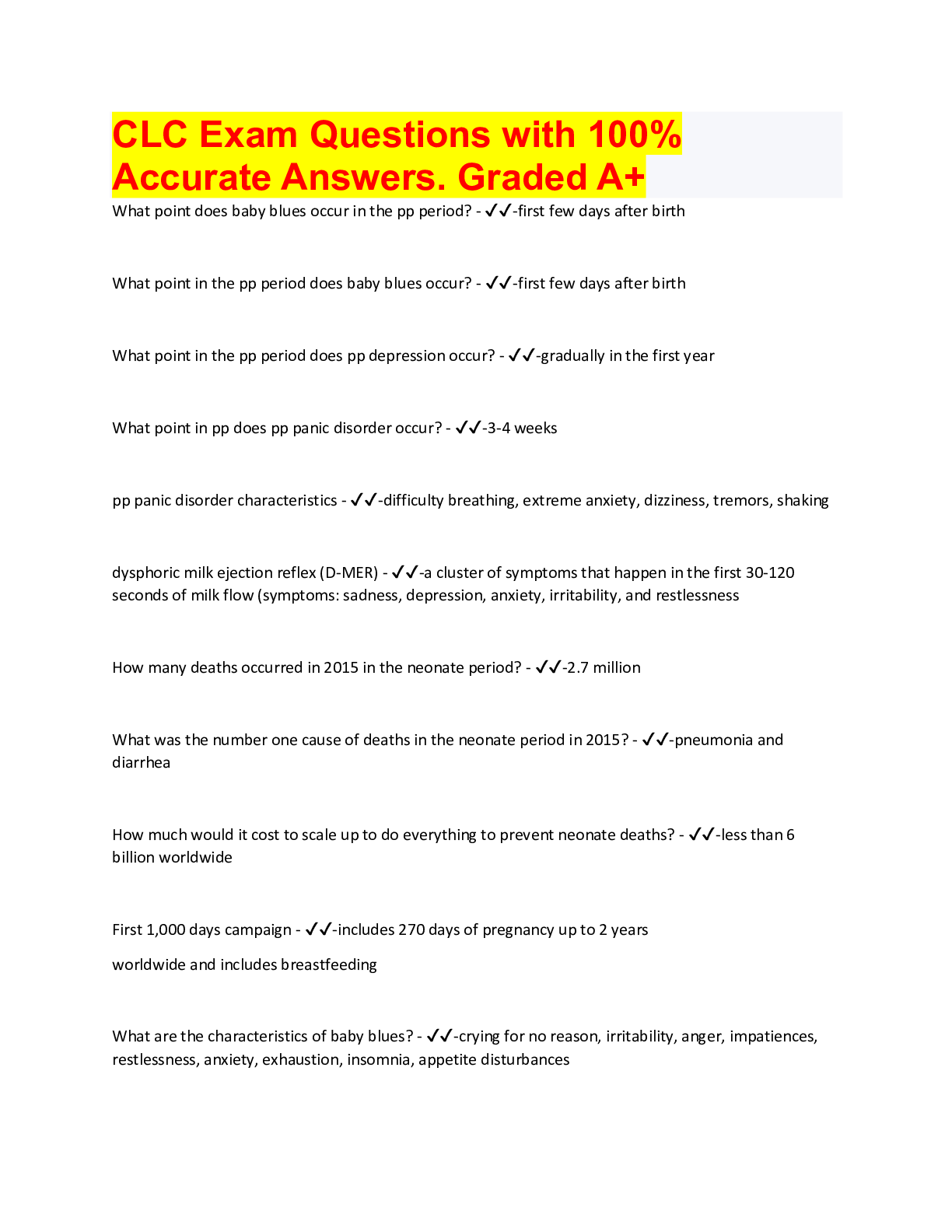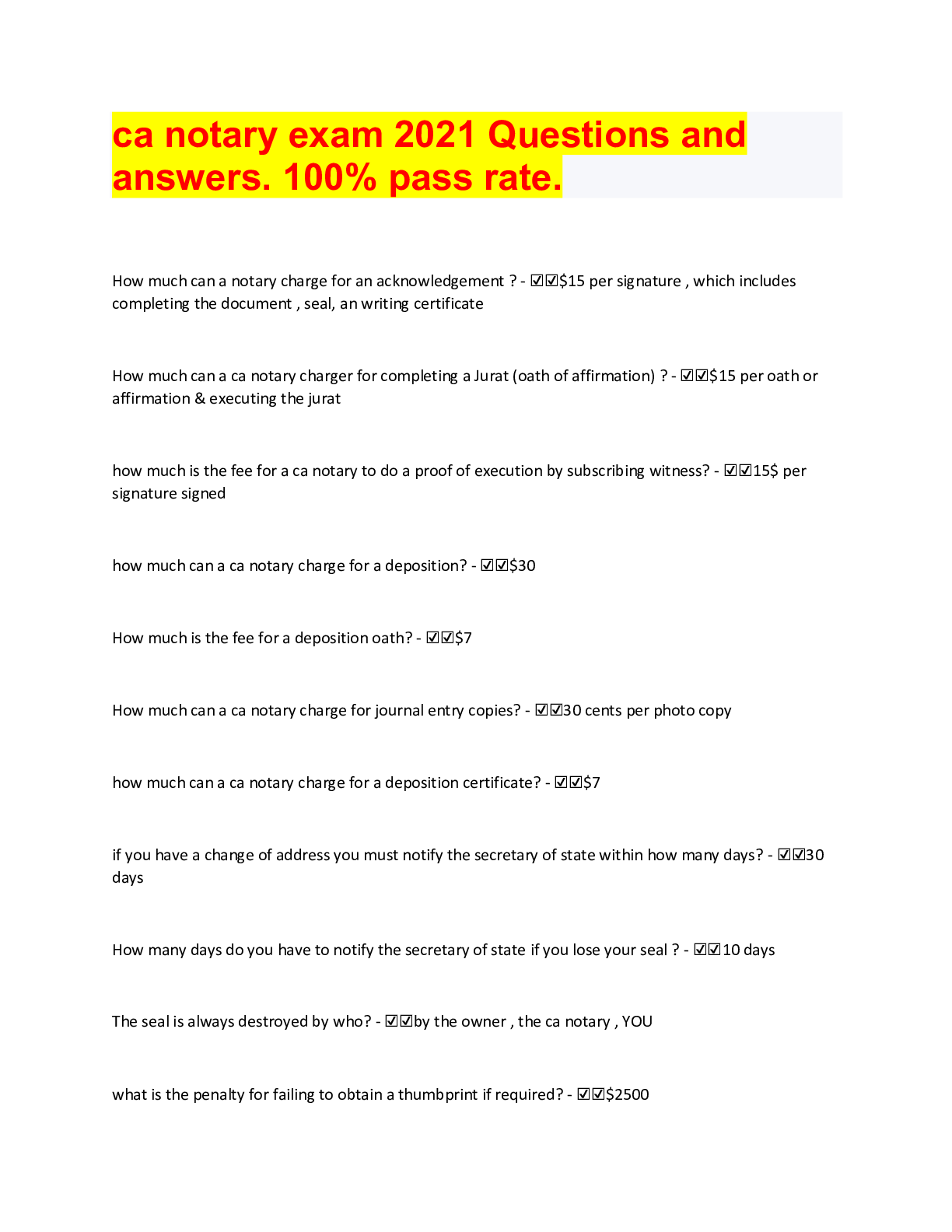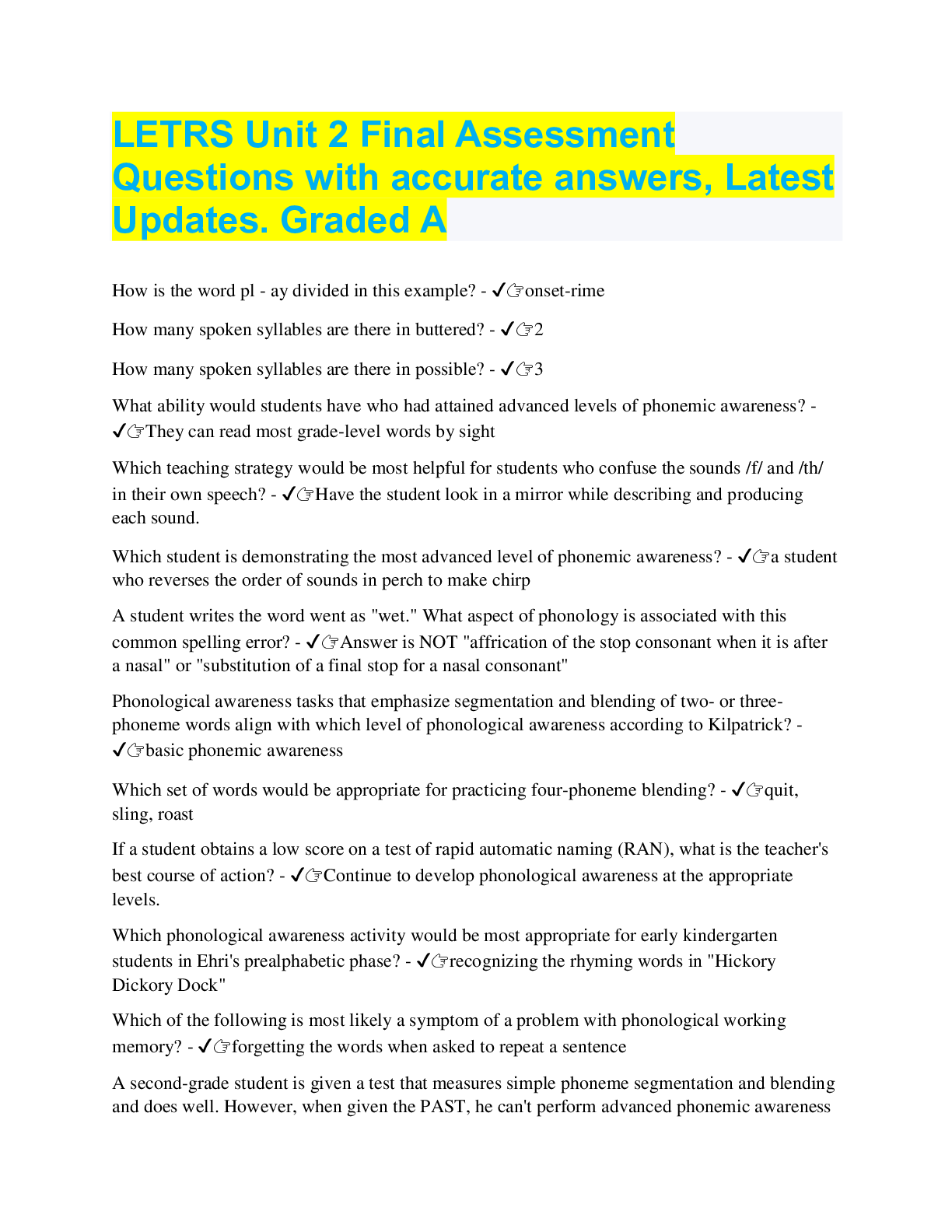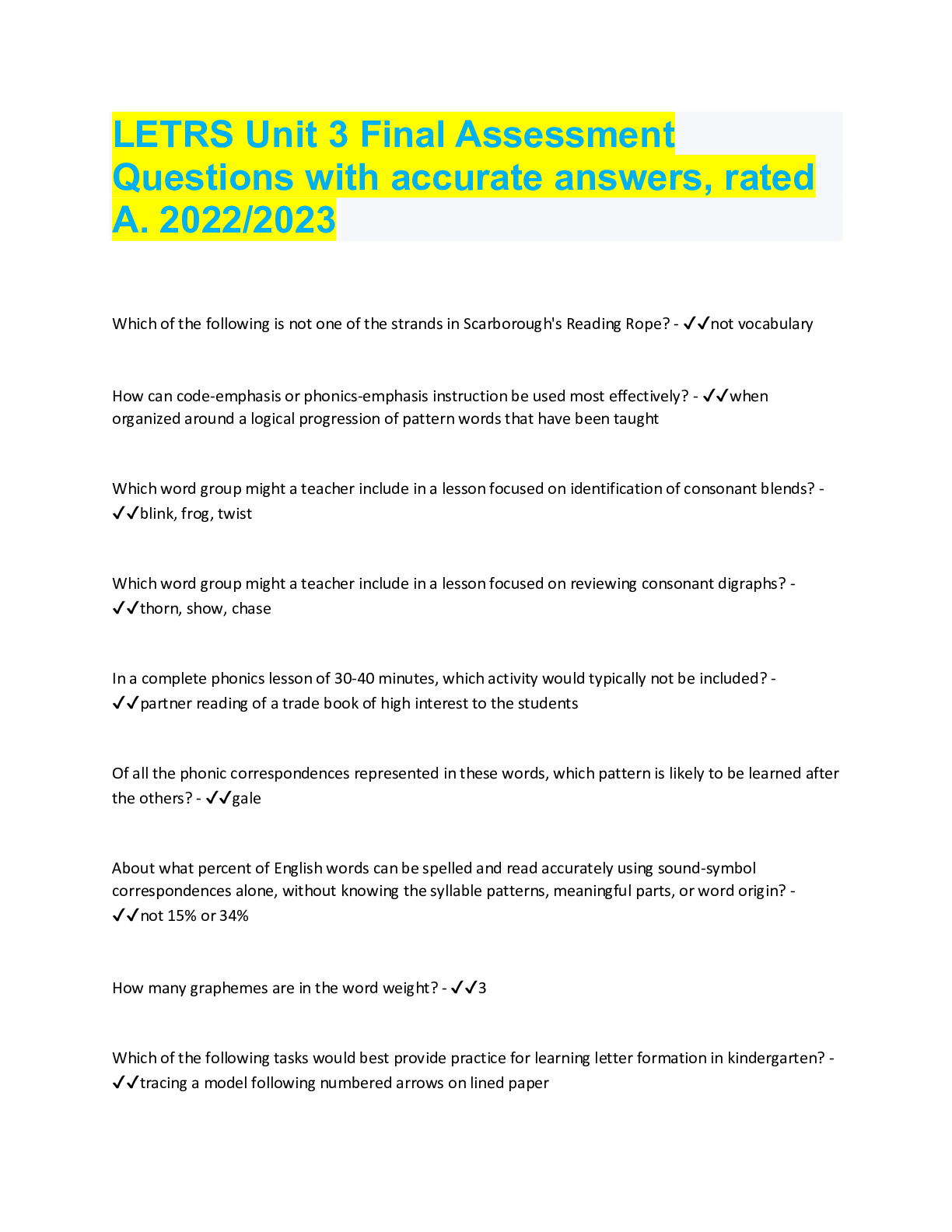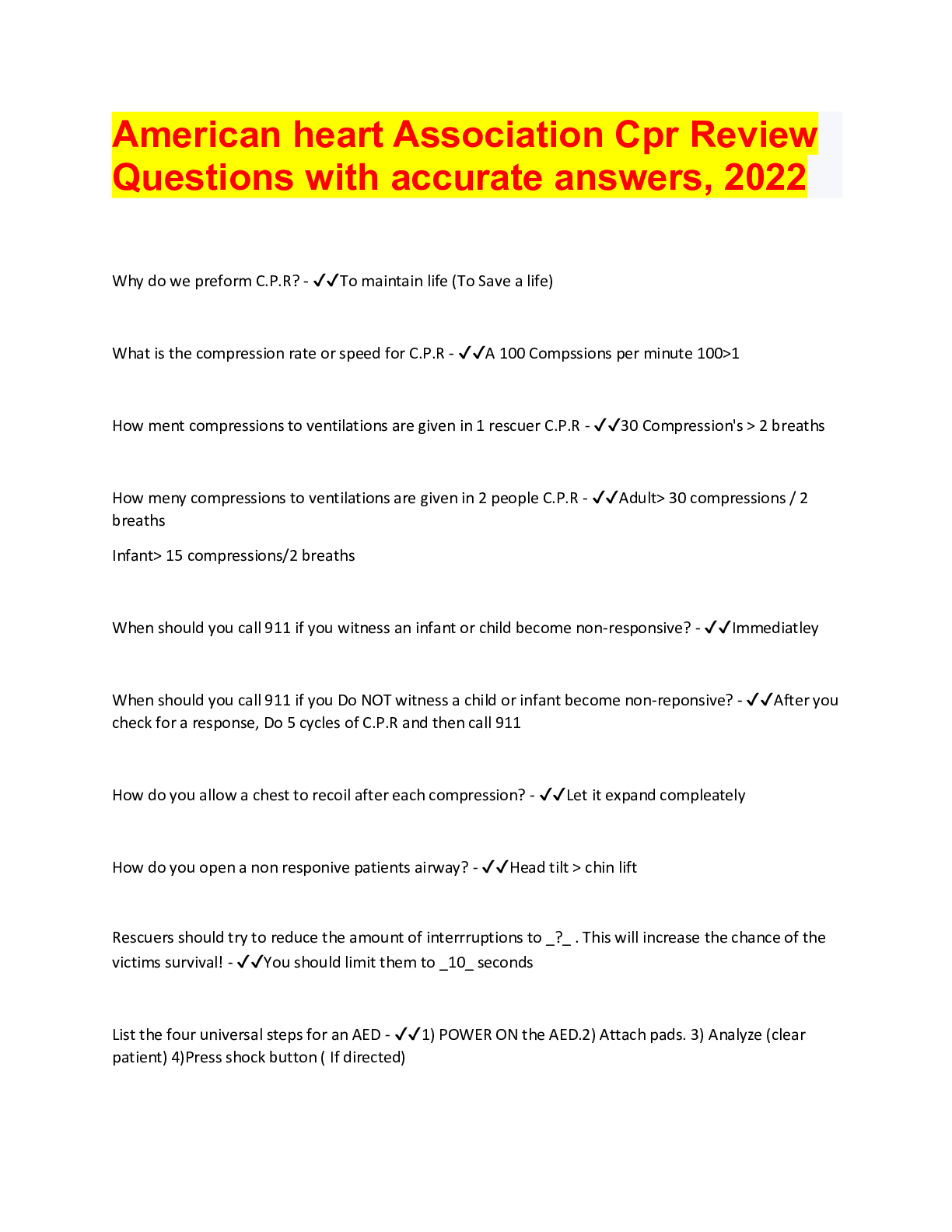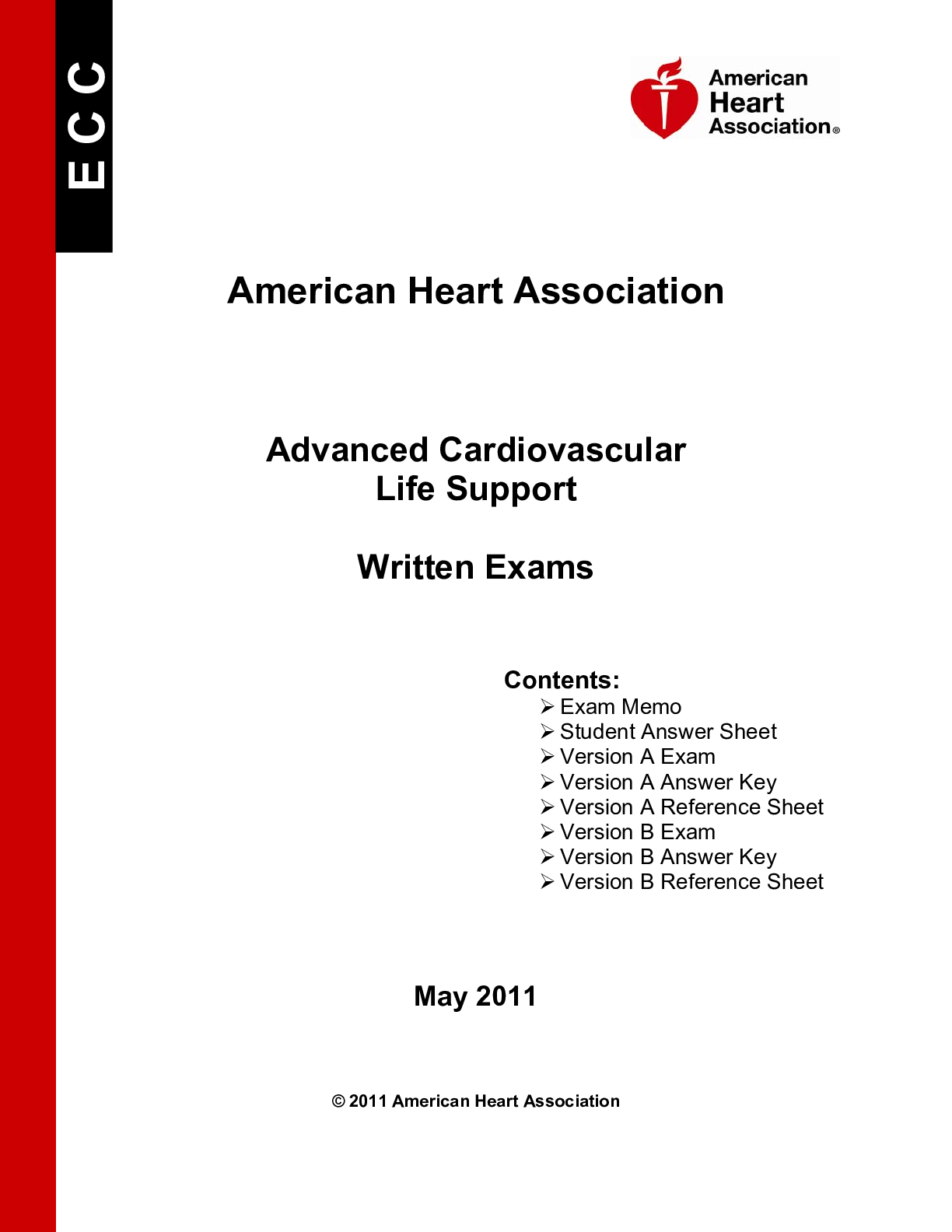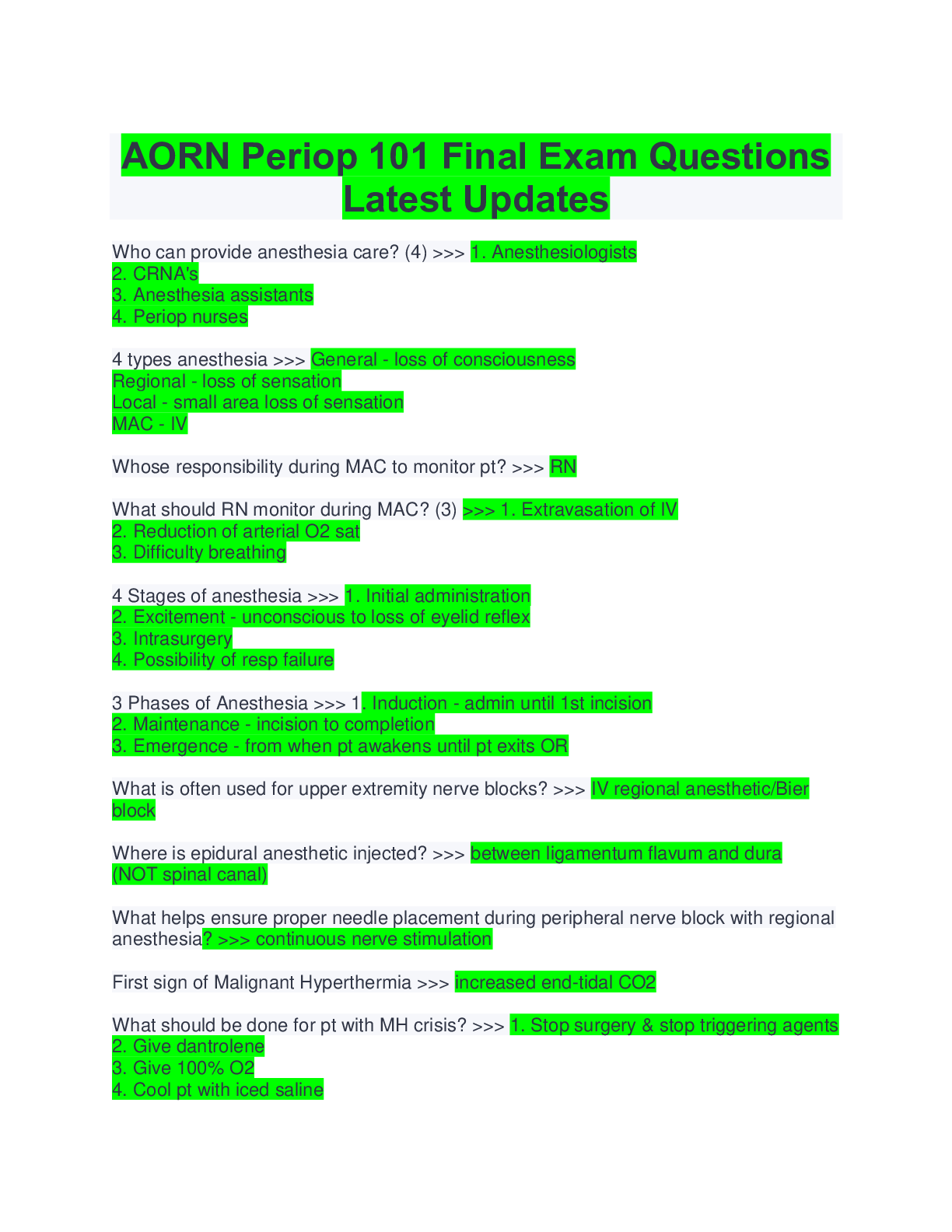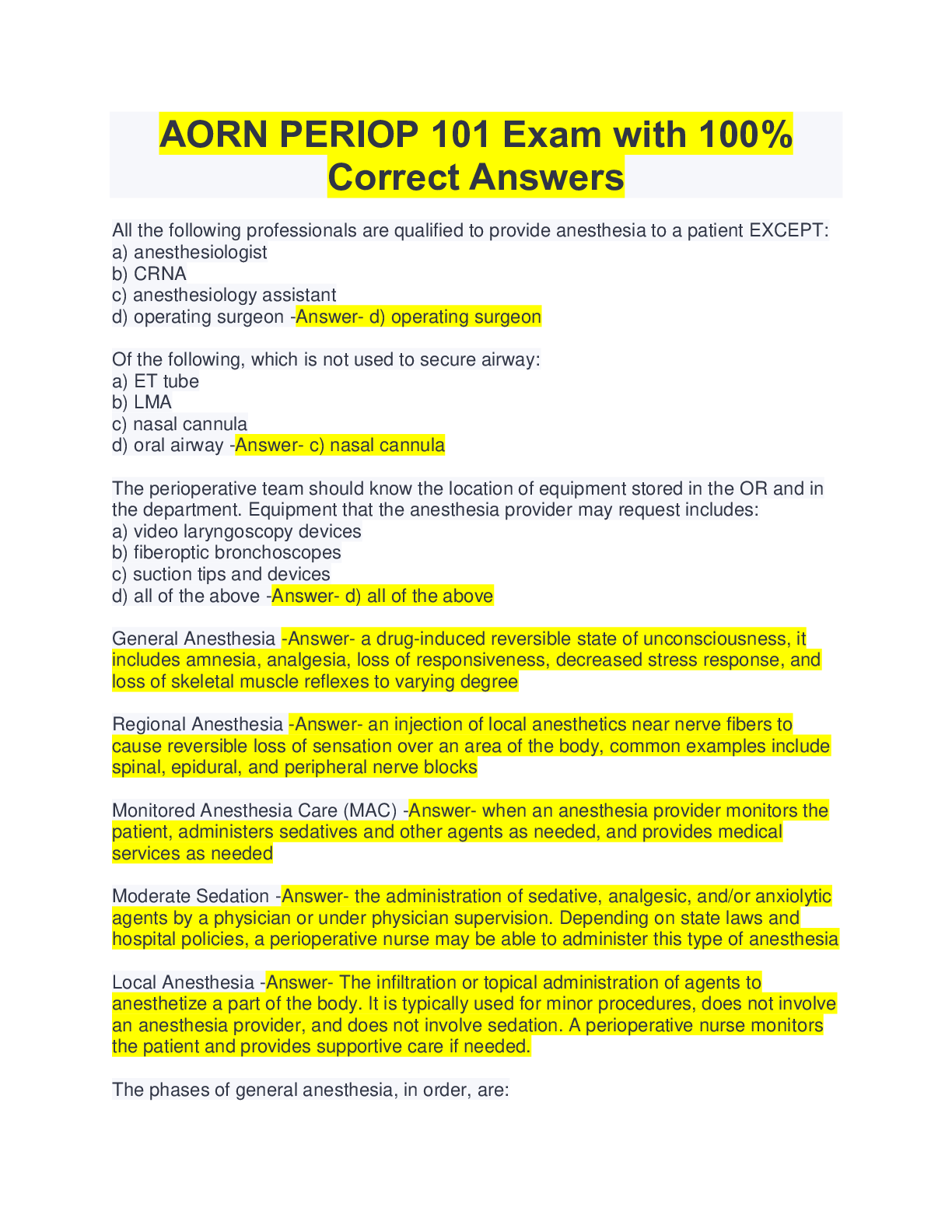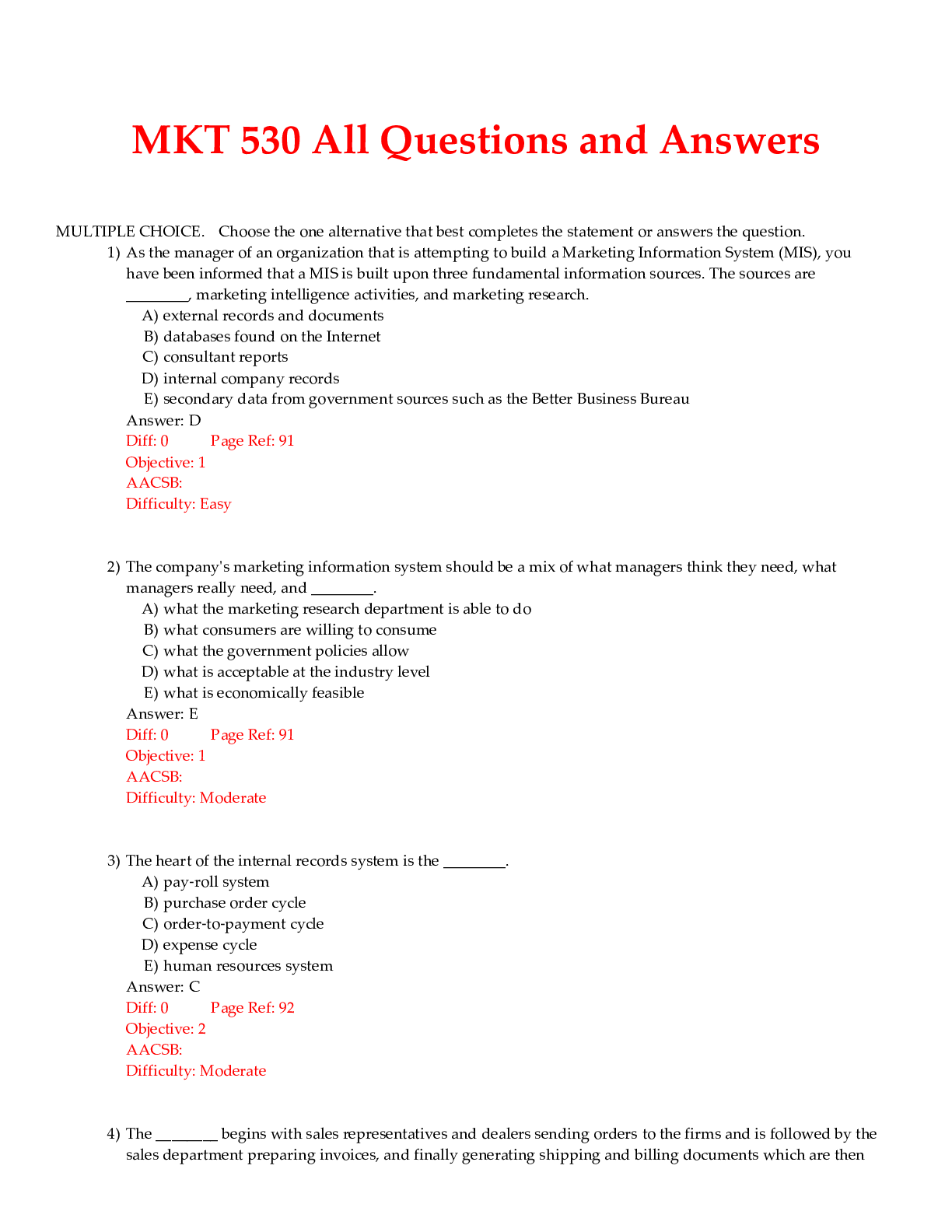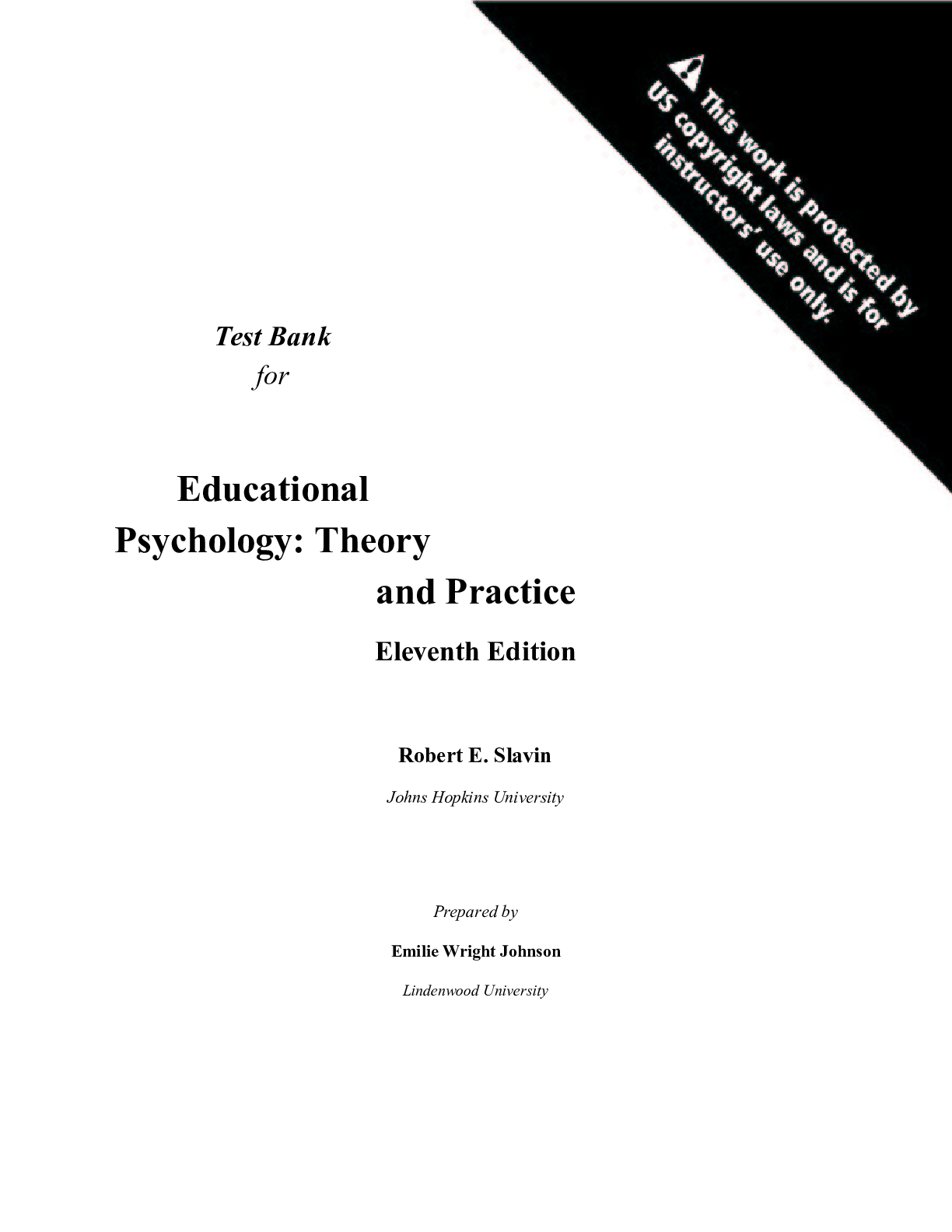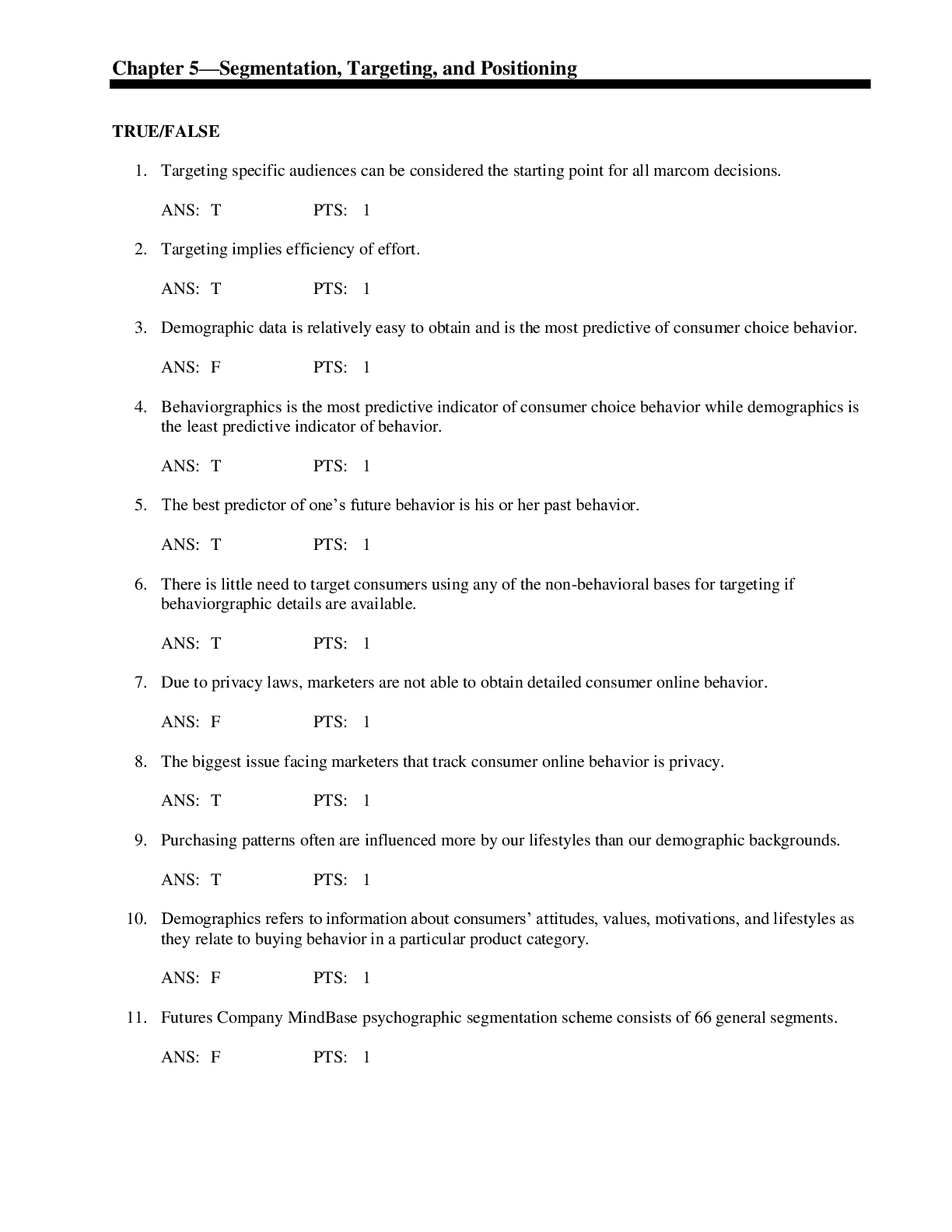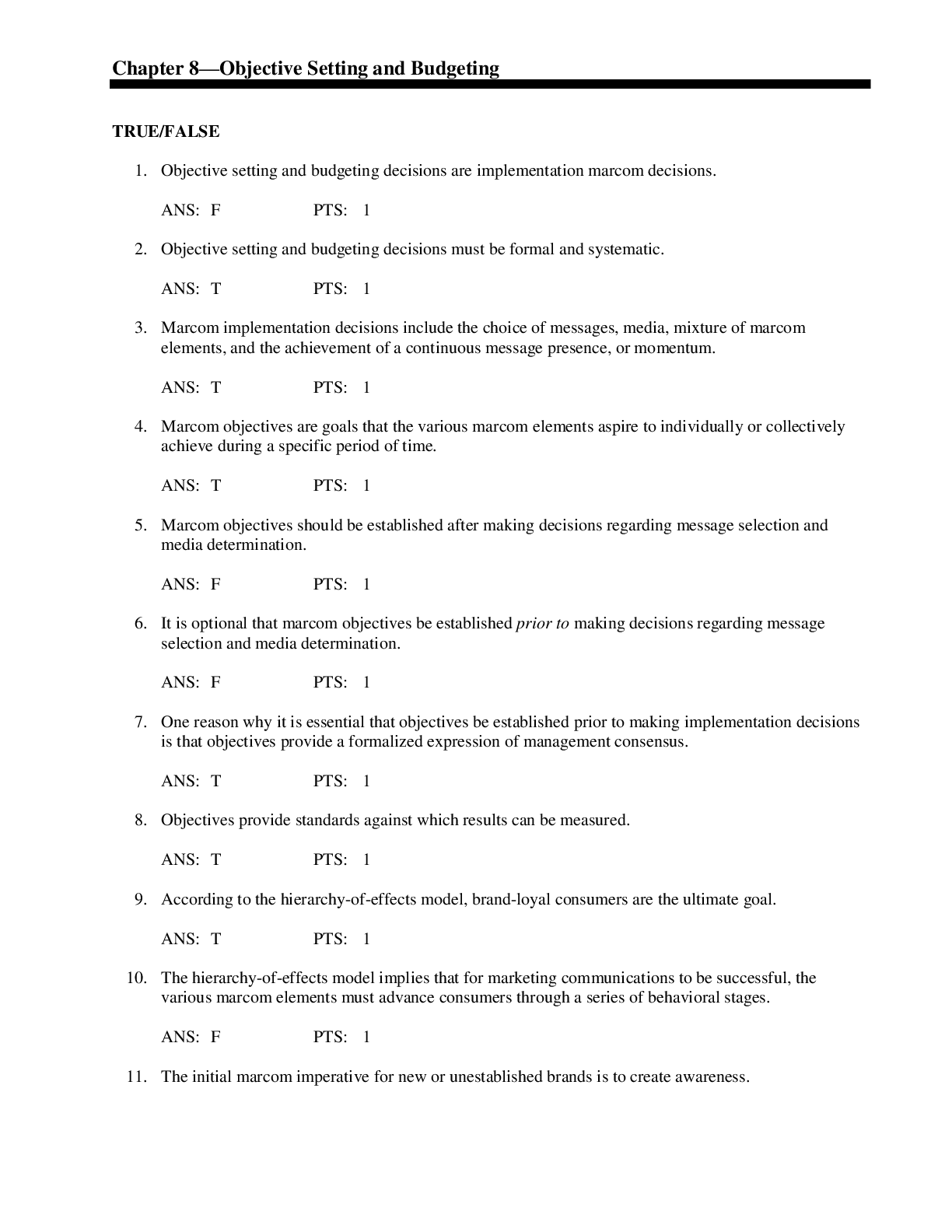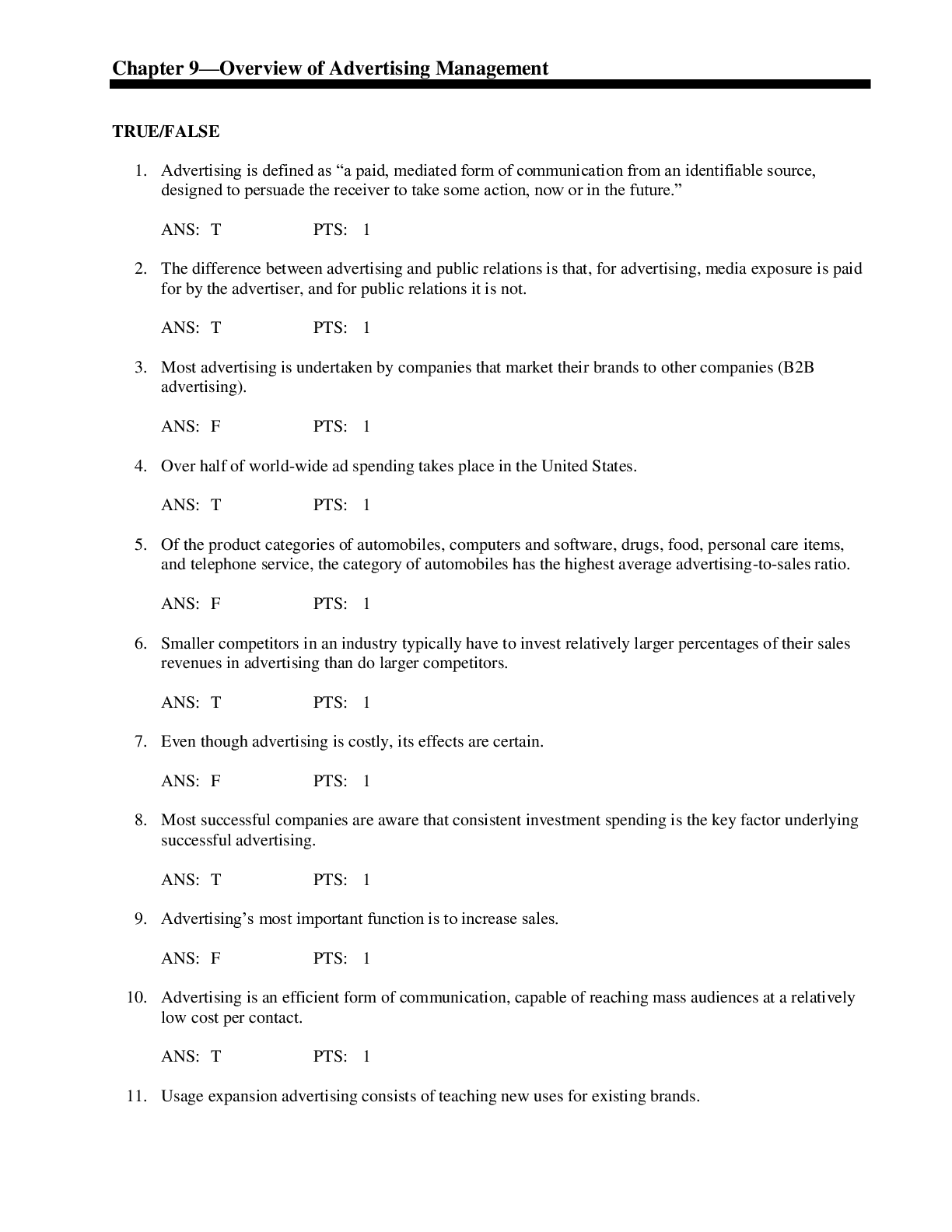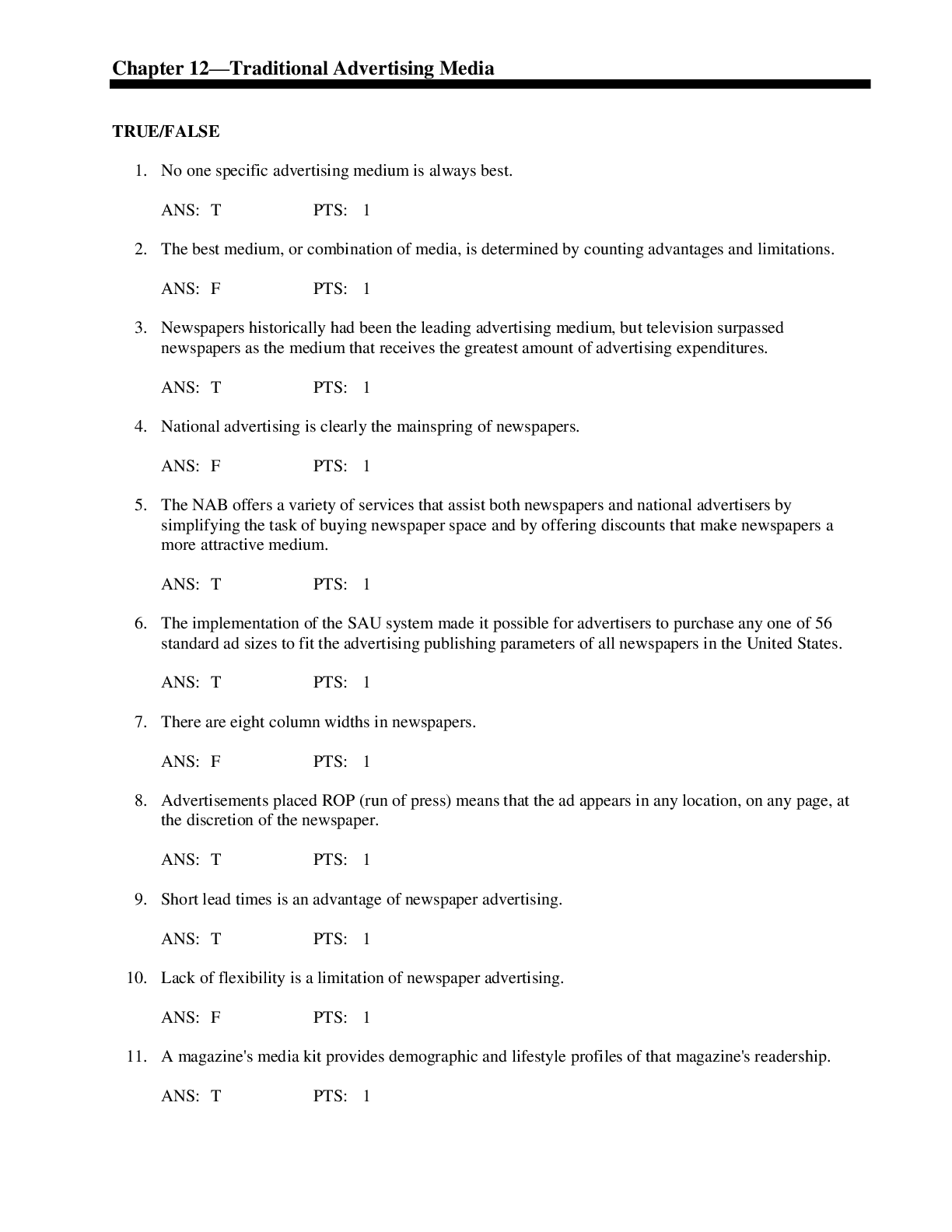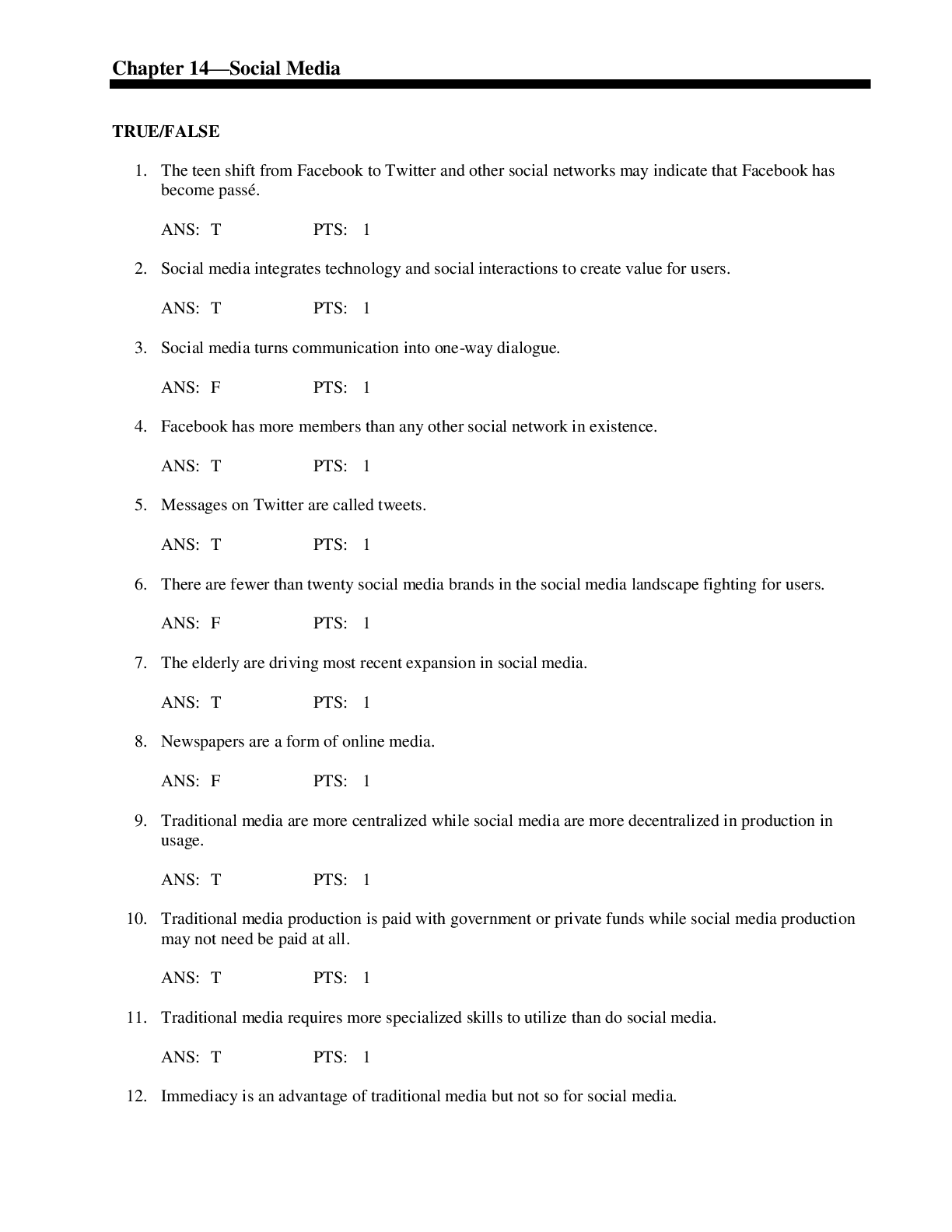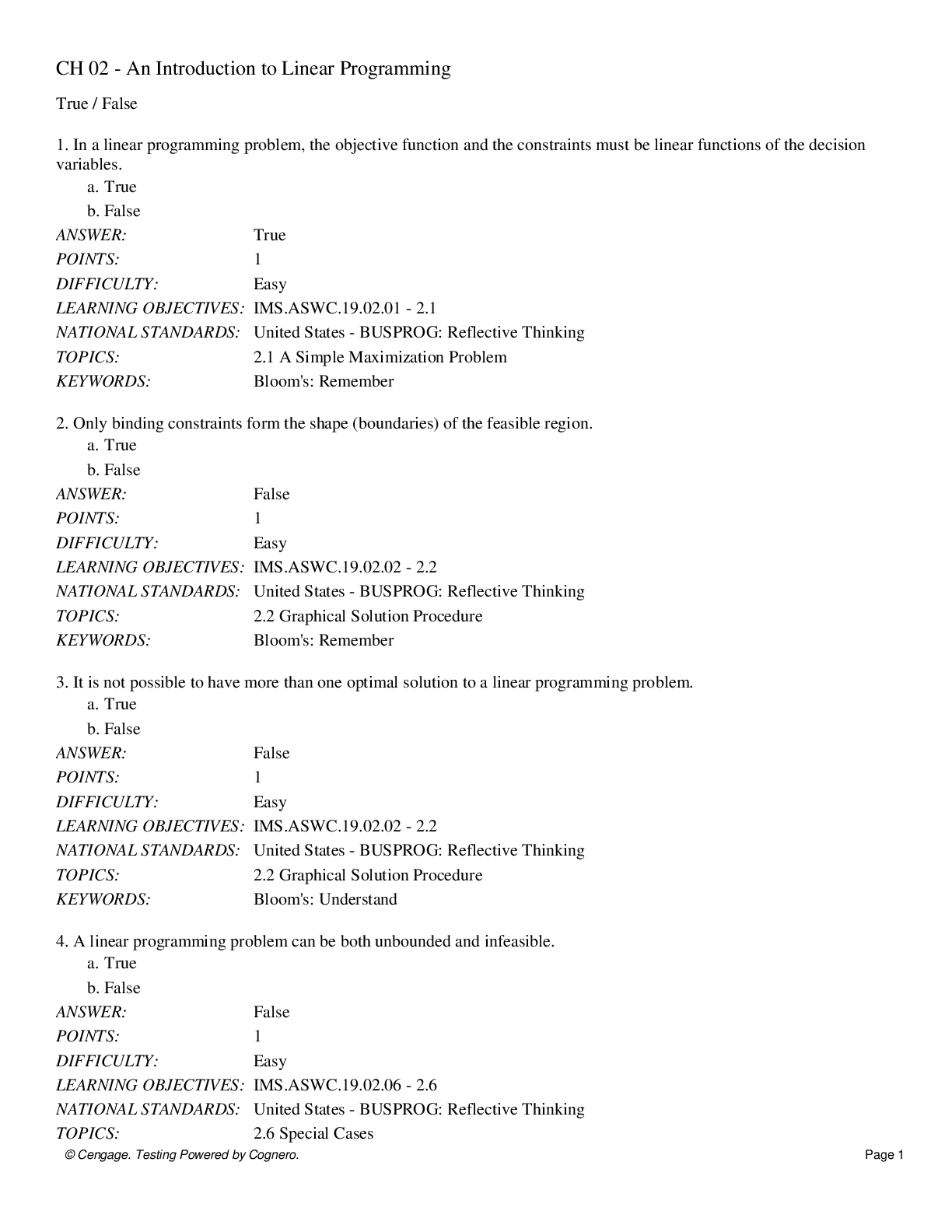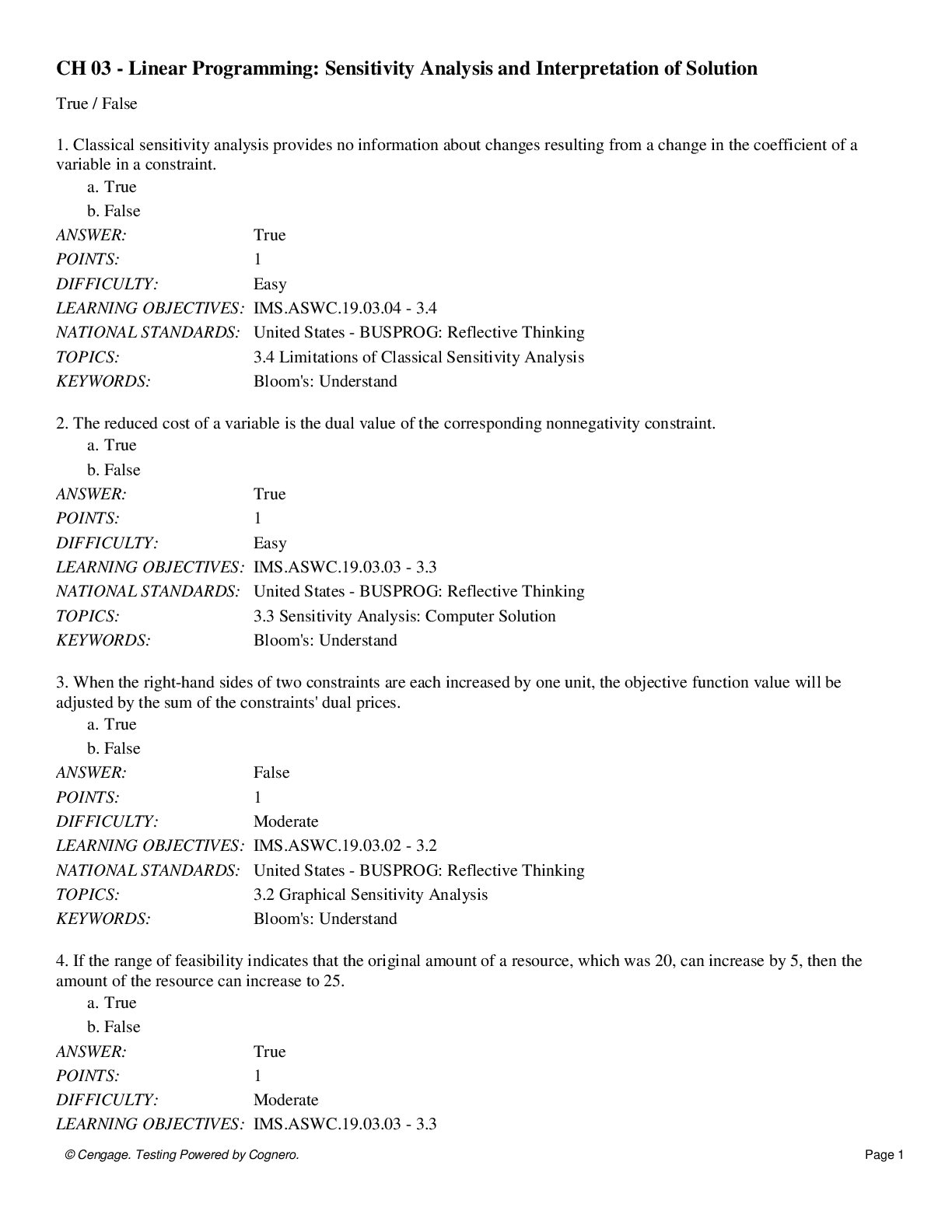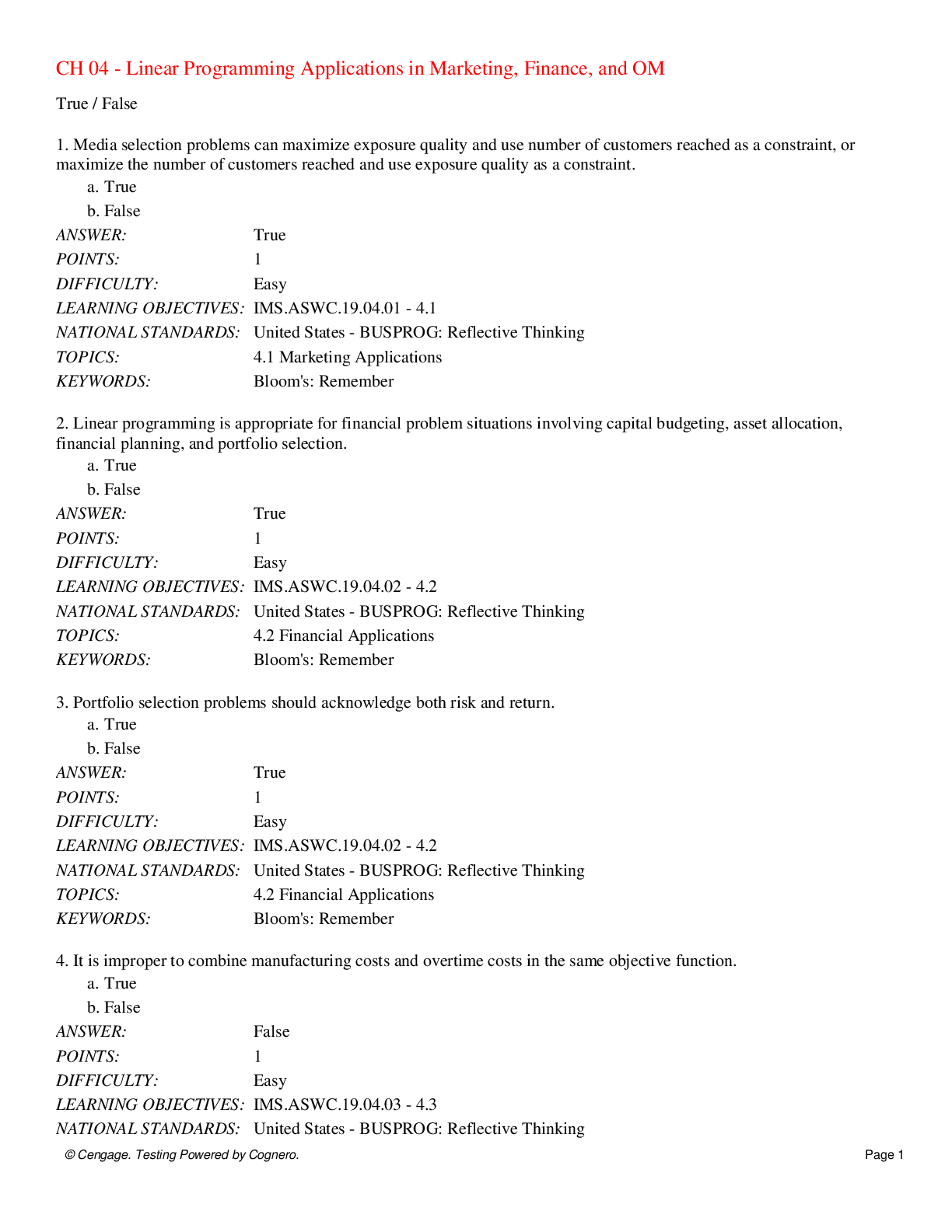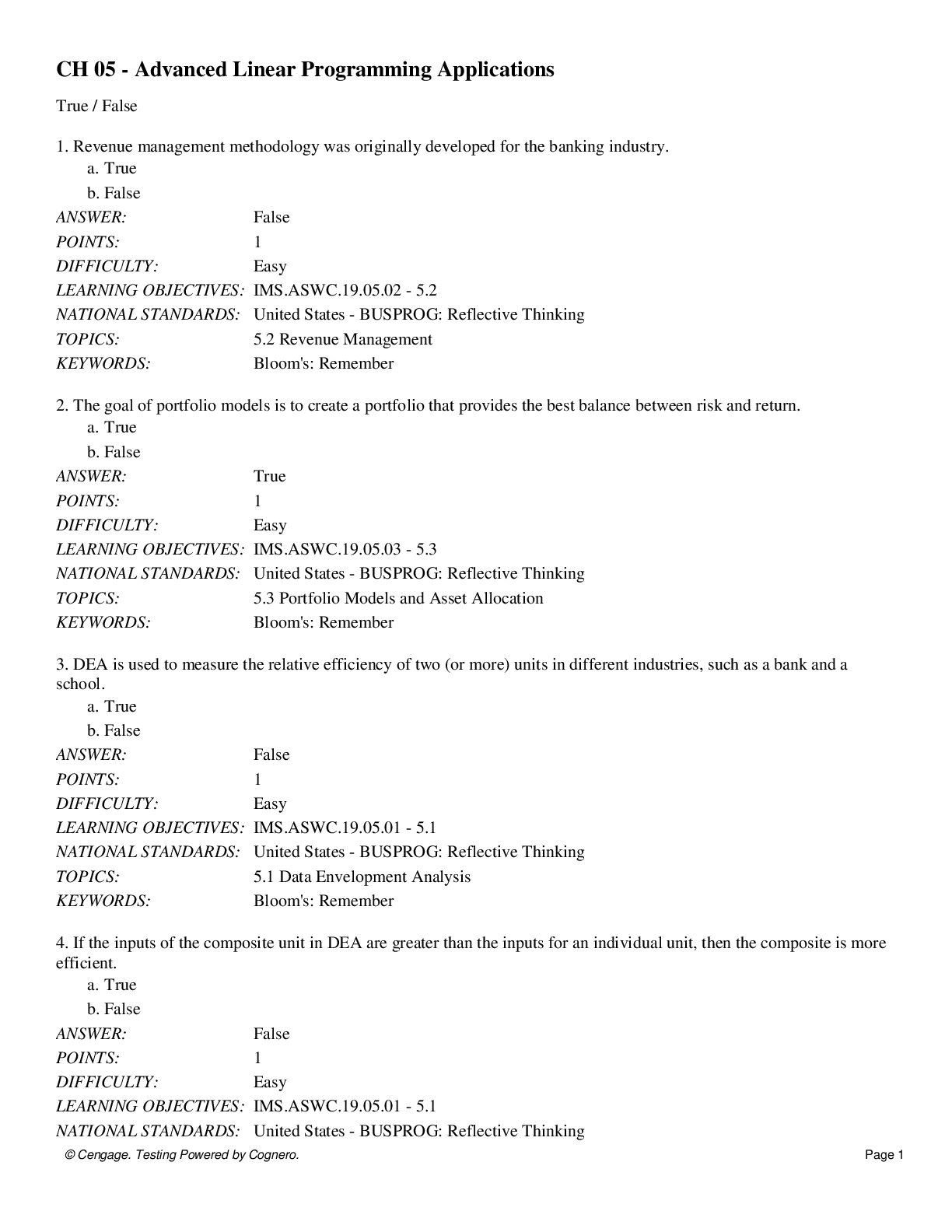Business Ethics > QUESTIONS & ANSWERS > WGU C961 Ethics in Technology Questions and Answers 100% Pass (All)
WGU C961 Ethics in Technology Questions and Answers 100% Pass
Document Content and Description Below
WGU C961 Ethics in Technology Questions and Answers 100% Pass Bathsheba Syndrome ✔✔The moral corruption of people in power, which is often facilitated by a tendency for people to look the other... way when their leaders act inappropriately. Corporate Social Responsibility (CSR) ✔✔The concept that an organization should act ethically by taking responsibility for the impact of its actions on its shareholders, consumers, employees, community, environment, and suppliers. Ethics ✔✔A code of behavior that is defined by the group to which an individual belongs. Integrity ✔✔Adherence to a personal code of principles. Morals ✔✔The personal principles upon which an individual bases his or her decisions about what is right and what is wrong. Supply Chain Sustainability ✔✔A component of corporate social responsibility (CSR) that focuses on developing and maintaining a supply chain that meets the needs of the present without compromising the ability of future generations to meet their needs. Acceptable Use Policy (AUP) ✔✔A document that stipulates restrictions and practices that a user must agree in order to use organizational computing and network resources. Advanced Persistent Threat (APT) ✔✔A network attack in which an intruder gains access to a network and stays there--undetected--with the intention of stealing data over a long period of time (weeks/ even months)Agreement on Trade-Related Aspects of Intellectual Property Rights (TRIPS) ✔✔An agreement of the World Trade Organization that requires member governments to ensure that intellectual property rights can be enforced under their laws and that penalties for infringement are tough enough to deter further violations. Anonymous Expression ✔✔The expression of opinions by people who do not reveal their identity. Anonymous Remailer Service ✔✔A service that allows anonymity on the internet by using a computer program that strips the originating header and/or IP address from the message and then forwards the message to its intended recipient. Anti-SLAPP Laws ✔✔Laws designed to reduce frivolous SLAPPs (strategic lawsuit against public participation), which is a lawsuit filed by corporations, government officials, and others against citizens and community groups who oppose them on matters of concern. Antivirus Software ✔✔Software that scans for a specific sequence of bytes, known as a virus signature, that indicates the presence of a specific virus. Artificial Intelligence Systems ✔✔The people, procedures, hardware, software, data, and knowledge needed to develop computer systems and machines that can simulate human intelligence processes, including learning (the acquisition of information and rules to reach conclusions), and self-correction (using the outcome from one scenario to improve its performance on future scenarios). Audit Committee ✔✔A group that provides assistance to the board of directors in fulfilling its responsibilities with respect to the oversight of the quality and integrity of the organization's accounting and reporting practices and controls, including financial statements and reports; the organization's compliance with legal and regulatory requirements; the qualifications, independence, and performance of the company's independent auditor; and the performance of the company's internal audit team.Blended Threat ✔✔A sophisticated threat that combines the features of a virus, worm, Trojan horse, and other malicious code into a single playload. Body of Knowledge ✔✔An agreed upon set of skills and abilities that all licensed professionals must possess. Botnet ✔✔A large group of computers, which are controlled from one or more remote locations by hackers, without the knowledge or consent of their owners. Breach of Contract ✔✔The failure of one party to meet the terms of a contract. Breach of the Duty of Care ✔✔The failure to act as a reasonable person would act. Bribery ✔✔The act of providing money, property, or favors to someone in business or government in order to obtain a business advantage. Bring Your Own Device (BYOD) ✔✔A Business policy that permits--and in some cases, encourages--employees to use their own mobile devices (smartphones, tablets, or laptops) to access company computer resources and applications, including email, corporate intranet, and the internet. BSA | The Software Alliance (BSA) ✔✔The trade groups that represent the world's largest software and hardware manufacturers. Business Continuity Plan ✔✔A risk-based strategy that includes an occupant emergency evacuation plan, a continuity of operations plan, and an incident management plan with an active governance process to minimize the potential impact of any security incident and to ensure business continuity in the event of a cyberattack or some form of disaster.CAPTCHA (Completely Automated Public Turing Test to Tell Computers and Humans Apart) ✔✔Software that generates and grades tests that humans can pass and all but the most sophisticated computers programs cannot. Certification ✔✔Indicates that a professional possesses a particular set of skills, knowledge, or abilities, in the opinion of the certifying organization. Certification can also apply to products (e.g., the Wi-Fi CERTIFIED logo assures that the product has met rigorous interoperability testing to ensure that it will work with other Wi-Fi certified products) and is generally voluntary. Child Online Protection Act (COPA) ✔✔An act signed into law in 1998 with the aim of prohibiting the making of harmful material available to minors via the internet; the law was ultimately ruled largely unconstitutional. Children's Internet Protection Act (CIPA) ✔✔An act passed in 2000; it required federally financed schools and libraries to use some form of technological protection (such as an internet filter) to block computer access to obscene material, pornography, and anything else considered harmful to minors. CIA Security Triad ✔✔Refers to confidentiality, integrity, and availability. Clinical Decision Support (CDS) ✔✔A process and a set of tools designed to enhance healthcare related decision making through the use of clinical knowledge and patient-specific information to improve healthcare delivery. Code of Ethics ✔✔A statement that highlights an organization's key ethical issues and identifies the overarching values and principles that ate important to the organization and its decisionmaking.Community Decency Act (CDA) ✔✔Title V of the Telecommunications Act, it aimed at protecting children from pornography, including imposing $250,000 fines and prison terms of up to two years for the transmission of "indecent" material over the internet. Compliance ✔✔To be in accordance with established policies, guidelines, specifications, or legislation. Computer Forensics ✔✔A discipline that combines elements of law and computer science to identify, collect, examine, and preserve data from computer systems, networks, and storage devices in a manner that preserves the integrity of the data gathered so that it is admissible as evidence in a court of law. Computerized Provider Order Entry (CPOE) System ✔✔A system that enables physicians to place orders (for drugs, laboratory tests, radiology, physical therapy) electronically, with the orders transmitted directly to the recipient. Conflict of Interest ✔✔A conflict between a person's (or firm's) self interest and the interests of a client. Contingent Work ✔✔A job situation in which an individual does not have an explicit contract for long term employment. Controlling the Assault of Non Solicited Pornography and Marketing (CANSPAM) Act ✔✔A law that specifies that it is legal to spam, provided the messages meet a few basic requirements: spammers cannot disguise their identity by using a false return address, the email must include a label specifying that it is an ad or a solicitation, and the email must include a way for recipients to indicate that they do not want future mass mailings.Copyright ✔✔The exclusive right to distribute, display, perform, or reproduce an original work in copies or to prepare derivative works based on the work; granted to creators of original works of authorship. Copyright Infringement ✔✔A violation of the rights secured by the owner of a copyright; occurs when someone copies a substantial and material part of another's copyrighted work without permission. Corporate Compliance Officer ✔✔See Corporate Ethics Officer Corporate Ethics Officer ✔✔A senior-level manager who provides an organization with vision and leadership in the area of business conduct. Cost Per Click (CPC) ✔✔One of the two common methods of charging for paid media in which ads are paid for only when someone actually clicks on them. Cost Per Thousand Impressions (CPM) ✔✔One of the two common methods of charging for paid media in which ads ate billed at a flat rate per 1,000 impressions, which is a measure of the number of times an ad is displayed whether it was actually clicked or not. Cyberabuse ✔✔Any form of mistreatment or lack of care, both physical and mental, using an electronic communications device that causes harm and distress to others. Cyberespionage ✔✔The deployment of malware that secretly steals data in the computer systems of organizations, such as government agencies, military contractors, political organizations, and manufacturing firms. Cyberharassment ✔✔A form of cyberabuse in which the abusive behavior, which involves the use of an electronic communications device, is degrading, humiliating, hurtful, insulting, intimidating,malicious, or otherwise offensive to an individual or a group of individuals, causing substantial emotional distress. Cybersquatter ✔✔A person or company that registers domain names for famous trademarks or company names to which they have no connection, with the hope that the trademark's owner will buy the domain name for a large sum of money. Cyberstalking ✔✔Threatening behavior or unwanted advances directed at an adult using the internet or other forms of online and electronic communications; the adult version of cyberbullying. Cyberterrorism ✔✔The intimidation of the government or civilian population by using information technology to disable critical national infrastructure (e.g., energy, transportation, financial, law enforcement, and emergency response) to achieve political, religious, or ideological goals. Decision Support System (DDS) ✔✔A type of business information system used to improve decision making in a variety of industries. Defamation ✔✔Making either an oral or a written statement of the alleged fact that is false and that harms another person. Defend Trade Secrets Act of 2016 ✔✔An act passed in 2016 that amended the Economic Espionage Act to create a federal civil remedy for trade secret misappropriation. Department of Homeland Security (DHS) ✔✔A large federal agency with more than 240,000 employees and a budget of almost $65 billion whose goal is to provide for a "safer, more secure America, which is resilient against terrorism and other potential threats."Design Patent ✔✔A type of patent that permits its owner to exclude others from making, using, or selling the design in question. Digital Millennium Copyright Act (DMCA) ✔✔Signed into law in 1998, the act addresses a number of copyright issues, with Title II of the act providing limitations on the liability of an Internet service provider for copyright infringement. Disaster Recovery Plan ✔✔A documented process for recovering an organization's business information system assets--including hardware, software, data, networks, and facilities--in the event of a disaster. Distributed Denial-of-Service (DDoS) Attack ✔✔An attack in which a malicious hacker takes over computers via the internet and causes them to flood a target site with demands for data and other small tasks. Doxing ✔✔Doing research on the internet to obtain someone's private personal information--such as home address, email address, phone numbers, and place of employment-- and even private electronic documents, such as photographs, and then posting that information online without permission. Duty of Care ✔✔The obligation to protect people against any unreasonable harm or risk. Earned Media ✔✔Media exposure an organization gets through press and social media mentions, positive online ratings, reviews, tweets and retweets, reposts ( or "shares"), recommendations, and so on. Economic Espionage Act (EEA) of 1996 ✔✔An act passed in 1996 to help law enforcement agencies pursue economic espionage. It imposes penalties of up to $10 million and 15 years in prison for the theft of trade secrets.Electronic Health Record (EHR) ✔✔A comprehensive view of the patient's complete medical history designed to be shared with authorized providers and staff from more than one organization. Electronic Medical Record (EMR) ✔✔A collection of health related information on an individual that is created, managed, and consulted by authorized clinicians and staff within a single healthcare organization. Electronic Product Environmental Assessment Tool (EPEAT) ✔✔A system that enables purchasers to evaluate, compare, and select electronic products based on a total of 51 environmental criteria. Employee Leasing ✔✔A business arrangement in which an organization (called the subscribing firm) transfers all or part of its workforce to another firm (called the leasing firm), which handles all human resource-related activities and costs, such as payroll, training, and the administration of employee benefits. The subscribing firm leases these workers to an organization, but they remain employees of the leasing firm. Encryption ✔✔The process of scrambling messages or data in such a way that only authorized parties can read it. Encryption Key ✔✔A value that is applied (using an algorithm) to a set of unencrypted text (plaintext) to produce encrypted text that appears as a series of seemingly random characters (ciphertext) that is unreadable by those without the encryption key needed to decipher it. Exploit ✔✔An attack on an information system that takes advantage of a particular system vulnerability. Fair Use Doctrine ✔✔A legal doctrine that allows portions of copyrighted materials to be used without permission under certain circumstances. Title 17, section 107, of the U.S. Code established the following four factors that courts should consider when deciding whether a particular use ofcopyrighted property is fair and can be allowed without penalty: (1) the purpose and character of the use (such as commercial use or nonprofit, educational purposes); (2) the nature of the copyrighted work; (3) the portion of the copyrighted work used in relation to the work as a whole; and (4) the effect of the use on the value of the copyrighted work. False Claims Act ✔✔A law enacted during the U.S. Civil War to combat that sold supplies to the Union Army; also known as the Lincoln Law. See also qui tam [Show More]
Last updated: 1 year ago
Preview 1 out of 29 pages
Instant download
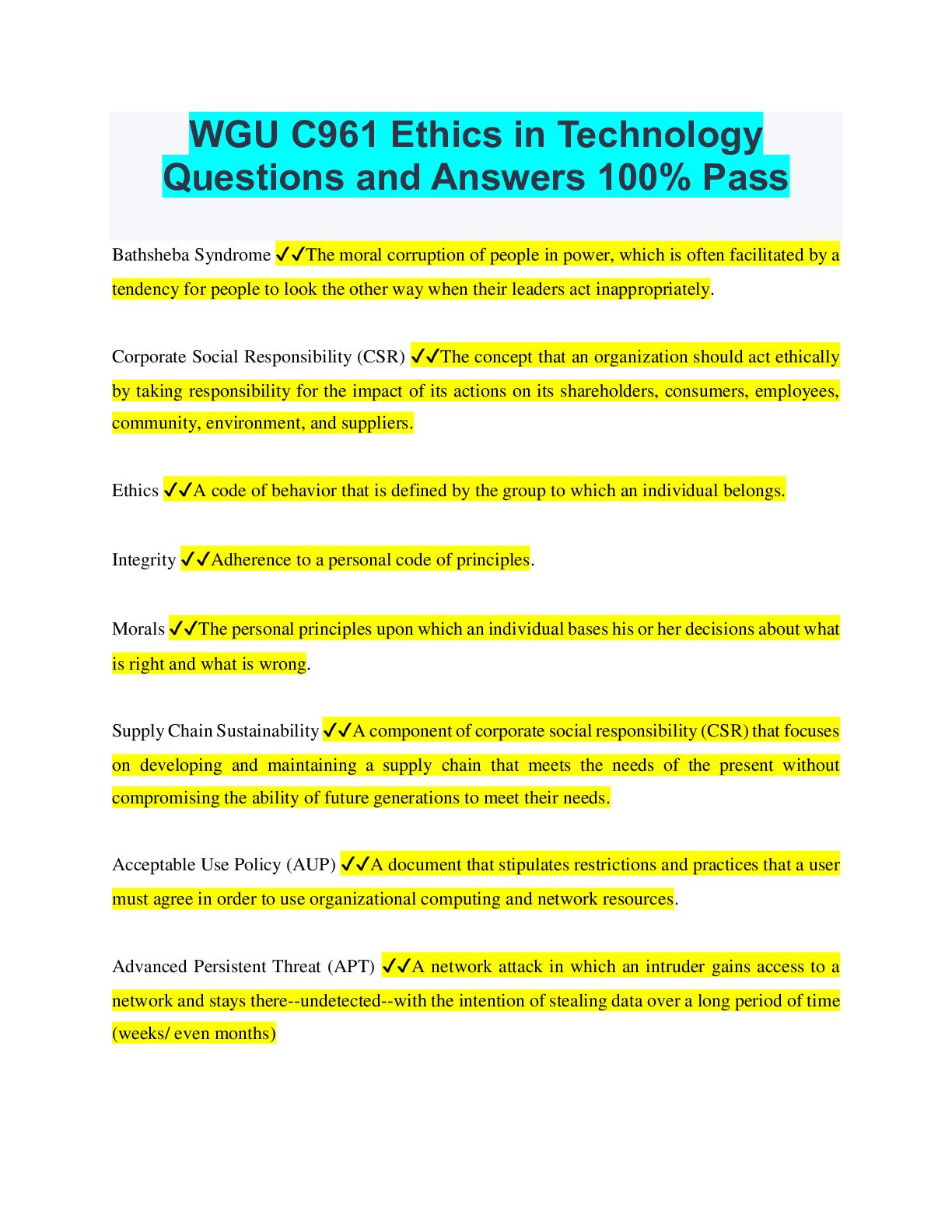
Buy this document to get the full access instantly
Instant Download Access after purchase
Add to cartInstant download
Also available in bundle (2)
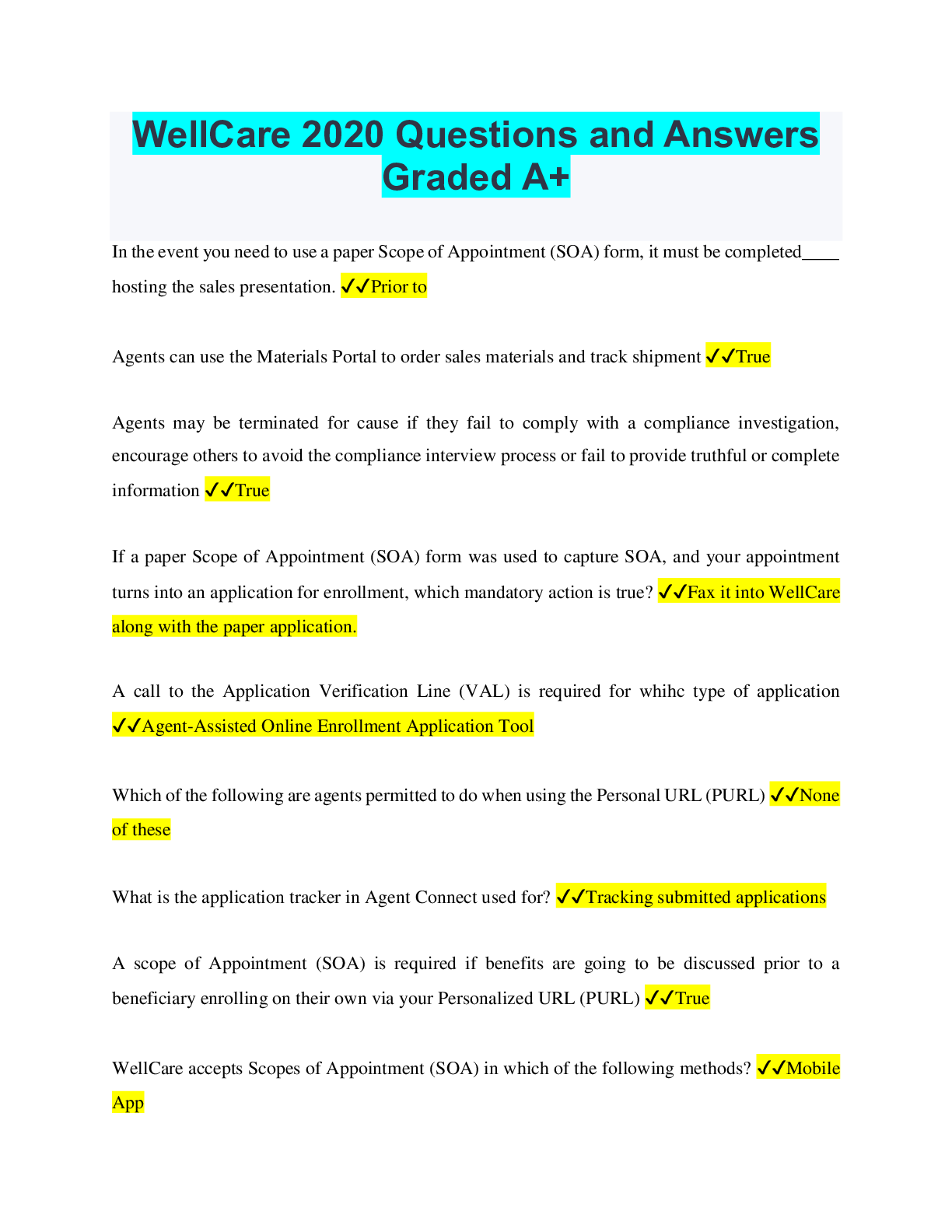
WGU C720 Operations and Supply Chain Management BUNDLE – Questions and Answers, 100% ACCURATE. RATED A
COMPRISE OF EXAMINABLE QUESTIONS WITH ACCURATE ANSWERS, RATED A.
By bundleHub Solution guider 1 year ago
$20
21
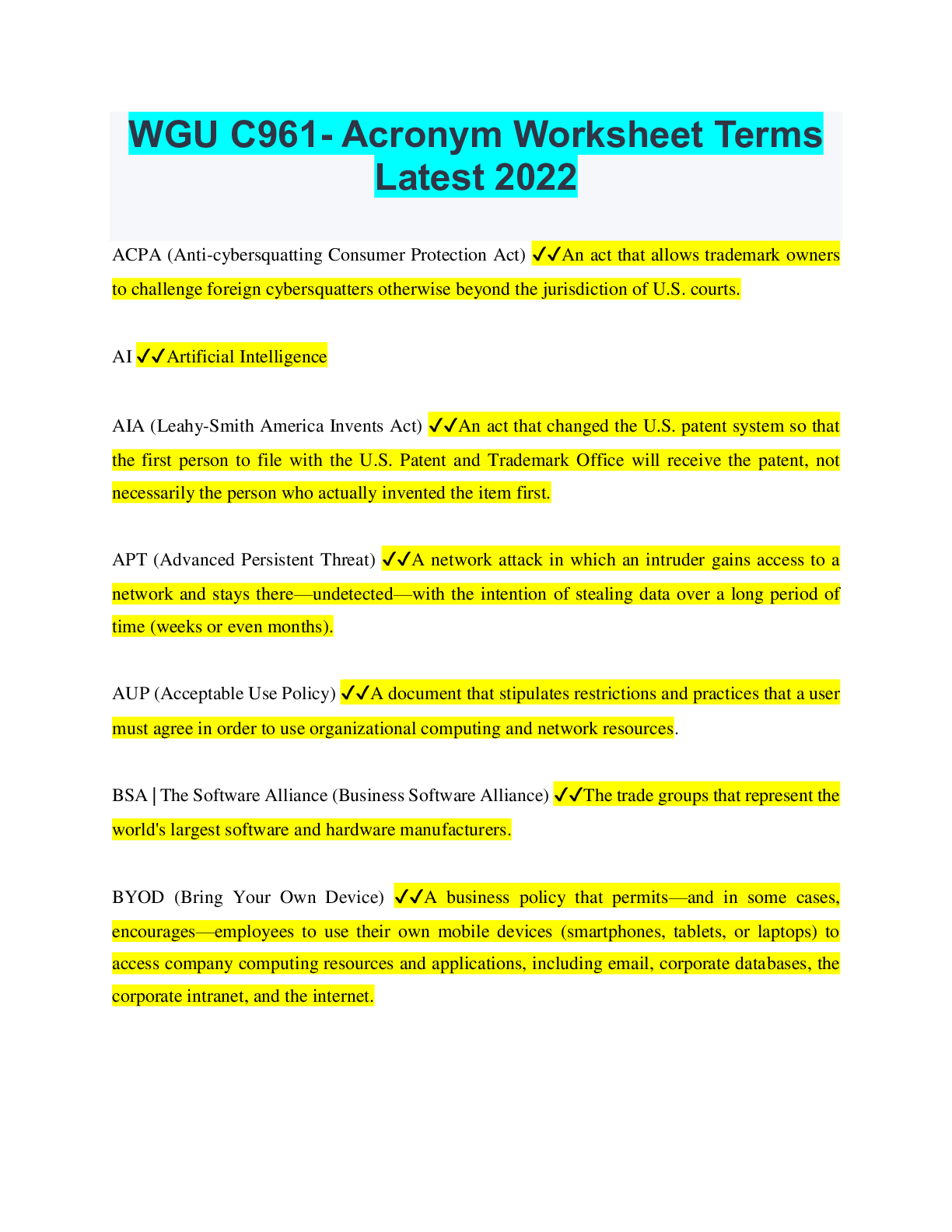
WGU C961 Ethics in Technology Bundle, Shortcut to score A.
Comprises of study sets and exam questions with accurate answers, rated A, WGU C961 Ethics in Technology Bundle, Shortcut to score A.
By bundleHub Solution guider 1 year ago
$26
9
Reviews( 0 )
Document information
Connected school, study & course
About the document
Uploaded On
Sep 28, 2022
Number of pages
29
Written in
Additional information
This document has been written for:
Uploaded
Sep 28, 2022
Downloads
0
Views
123

